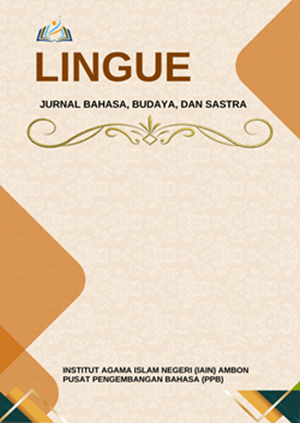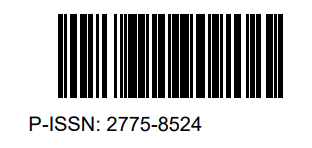CYBERPRAGMATICS OF POLITENESS IN NETIZENS’ COMMENTS ON THE INDONESIAN PRESIDENT’S INSTAGRAM POSTS
DOI:
https://doi.org/10.33477/lingue.v7i1.9455Keywords:
cyberpragmatics, negative politeness, netizen comments, social mediaAbstract
This study aims to reveal the content of negative politeness in netizens' speech in response to the President of Indonesia’s Instagram posts for the 2024–2029 period, highlighting the disparity between expected norms of respectful digital interaction and the often impolite or aggressive language used in political commentaries. The approach used is descriptive qualitative based on pragmatic theory, especially Brown and Levinson's politeness theory, and supported by a cyberpragmatic approach. Data in the form of netizens' verbal speech was collected using note-taking and screen capture techniques, then analyzed using the Miles and Huberman interactive model. The results of the study show that many comments contain violations of negative politeness, such as unmitigated direct speech, sharp criticism, and even sarcasm that threatens the face of the interlocutor. However, some netizens still show politeness strategies by conveying criticism in a subtle and implicit manner. This phenomenon reflects changes in communication patterns on social media, which are characterized by freer expression but tend to ignore politeness norms. These findings reinforce the importance, especially in terms of language ethics, and open up space for the integration of a cyberpragmatic approach in learning Indonesian.
References
Afrilanda, W. A. (2024). Analisis Bentuk Tindak Tutur Ekspresif Pada Kolom Komentar Dalam Podcast Deddy Corbuzier Dengan Judul “Aku Sibuk Dengan Kekafiranku.” Jurnal Pendidikan Inklusif, 8(2), 46–54.
Ambarita, R. (2024). Characteristics of Impoliteness Formulas in Political Comments on Social Media : A Qualitative Study. Procedings of the 5th International Conference on English Languange Teaching. 10.2991/978-2-38476-333-7_5
Ambarwati, R., & Ajeng D, W. (2024). An Analysis of Politeness Comments by Indonesian National Team Football Players on Governor Ganjar Pranowo’s Instagram. KnE Social Sciences, 2024, 35–44. 10.18502/kss.v9i6.15252
Andini, S. T. (2023). Refusal Strategies Representing Power And Distance Of Trump & Biden : Final Debate Department Of English Literature Faculty Of Humanities Refusal Strategies Representing Power And Distance Of Trump & Biden : Final Debate Faculty Of Humanities.
Bhagaskoro, P., Pasopati, R. U., & Syarifuddin. (2016). Proceedings of International Conference on Language, Literary and Cultural Studies (ICON LATERALS 2016). Proceedings of International Conference on Language, Literary and Cultural Studies (ICON LATERALS 2016) Widyaloka Auditorium, October, 1–
13. 10.21776/ub.icon_laterals.2016.001.1.35
Dewi M. P. Y., Satya, G. H., & Ayu, P. P. S. (2024). Expressive Speech Acts Used in Traditional Market Activities in Buleleng Bali To Avoid the Fta. Southeast Asian Languange and Literature Studies (SALLS) Journal, 1(1). https://doi.org/10.55981/salls.2024.4931
Diani, I., Arono, & Wisma Yunita. (2022). A pragmatics study on verbal abuse against women and children by Bengkulu communities on social-media, at schools, and in families. KEMBARA Journal of Scientific Language Literature and Teaching, 8(2), 391–406. https://doi.org/10.22219/kembara.v8i2.21900
Djatmika, S. (2024). Persuasive Speech Act Strategies of Online Fashion Sellers in Live E-Commerce: A Cyberpragmatics Approach. Integrity Journal, 6–14.
Firdausi, N. I. (2020). Pemikiran Filosofis Pendidikan Multikultural Azyumardi Azra Dan Abuddin Nata. In Pascasarjana UIN Walosongo Semarang (Vol. 8, Issue 75).
Fitriana, R. (2014). Gender Differences In The Use Of Linguistic Features In Chat Room. In Procedia Manufacturing (Vol. 1, Issue 22 Jan).
Halil, N. I., Samsuddin, Yawan, H., & Yuliati. (2023). Exploring Directive Speech Acts in Elementary School Communication in Kolaka: Language Pedagogy Implications. International Journal of Language Education, 7(2), 241–254. https://doi.org/10.26858/ijole.v7i2.44948
Helmaliya, E. P., Andarwulan, T., & Panich, P. (2024). Politeness In The Digital Spotlight : Analyzing Language Use In Deddy Corbuzier ’ s ’ Close The Door ’ Podcast. 8(2).
Hilal, M., & Wahyudi, R. (2025). The Analysis of Emojis and Identities In The Comments Section on Instagram @ Ussfeed : From Semiotics to Cyberpragmatics. Journal of Pragmatics Research, 7(1), 132–156.
Juvent, A. P. & Rayyan, F.. (2024). Implementasi Sistem Informasi Manajemen Pendidikan untuk Meningkatkan Mutu Pendidikan. Merkurius : Jurnal Riset Sistem Informasi Dan Teknik Informatika, 2(4), 149–160.
Kunjana, R., R., Handoko, H., Rahmat, W., & Setyaningsih, Y. (2024). Javanese Silly Gags on Daily Communication on Social Media: Pragmatic Meanings and Functions Approach. Jurnal Arbitrer, 11(1), 49–60. https://doi.org/10.25077/ar.11.1.49-59.2024
Lailiyah, N. (2024). Perlocutions of 2024 Indonesian General Election : A Cyberpragmatics Perspective. Jurnal Kawistara, 14(3), 9–12.
Nurhikmah, Nursalam, Eko Prayetno, H. Y. (2024). Rural Community Development Through Community Service Program ( KKN ) in Malaka Hamlet , South Sulawesi Selatan. Jurnal Al Maesarah: Jurnal Pengabdian Kepada Masyarakat Bidang Pendidikan, Sosial, Dan Kemasyarakatan, 3(1), 28–40. https://doi.org/10.58988/jam.v3i1.372
Nurhikmah, N. (2024). Character Education Islam From the Views of Imam Al- Ghazali. Jurnal Al Burhan, 4(1), 53–66. https://doi.org/10.58988/jab.v4i1.300
Nurhikmah, N. I. P. (2025). Sharpening Kindergarten Children ’ s Creativity by Learning Numbers Through Plasticine. Abdurrauf Social Science, 2(1), 1–12. https://doi.org/10.70742/arsos.v2i1.64
Pramujiono, A., Ardhianti, M., Widya Hanindita, A., & Dian Andanty, F. (2024).
``Pak SUSNO cerdas banget’’ Compliment as a Realization of Brown and Levinson’s Politeness Strategy in Netizen Responses on YouTube. KnE Social Sciences, 2024, 281–292. https://doi.org/10.18502/kss.v9i6.15275
Pramujiono, A., Rohmah, N., Hanindita, A. W., & Ardhianti, M. (2023). Indonesian Netizens’ Emotive Language in Responding to YouTube Posts: Cyberpragmatics Study. KEMBARA Journal of Scientific Language Literature and Teaching, 9(2), 794–814.
Putri, W. N., Permana Arya Putra, K., & Elmadina Aisyah, A. (2024). Impoliteness in Digital Political Discourse: a Study of “Dirty Vote” Youtube Comments. 3(1), 2339–2193.
Rahmansyah, S., Nur, T., Indrayani, L. M., & Victoria Martha, D. C. (2020). The function of positive face threatening acts baldly on-record without redressive action in household and cyberconflict: a pragmatic study. Jurnal Sosioteknologi, 19(2), 249–260.
Sandjaja, A. (2024). Politeness Strategies In Social Media On Instagram Jennie Blackpink. PROSIDING: Seminar Nasional Ilmu Sosial & Teknologi, 561–565.
Sholehah, S. A., & Wafa, Z. (2023). Analysis of Politeness Strategies on Comments in Influencers Instagram Account. Journal of English Teaching and Applied Linguistics2023, 3(1), 1–8.
Solichin, M. M. (2020). Teori Belajar Humanistik Dan Aplikasinya Dalam Pendidikan Agama Islam. Jurnal Studi Islam, 5(1), 1–12.
Tamphu, S., Suyitno, I., Susanto, G., Budiana, N., Salim, M. R., Nurhikmah, &
Purnawati, W. (2024). Building bridges to the future of learning: Exploring artificial intelligence research using R-Studio assisted bibliometrics. Cogent Education, 11(1). https://doi.org/10.1080/2331186X.2024.2417623
Tia, F., & Yusni, K. A. (2023). Analysis of Perlocutional Speech Acts on Whatsapp Chat. LingLit Journal Scientific Journal for Linguistics and Literature, 4(1), 32– 39.
Widiana, Y. (2023). Javanese Maxims as Politeness Guidance in Social Media Phatic Communication: A Cyberpragmatics Perspective. Jurnal Javanologi, 5(1), 935. https://doi.org/10.20961/javanologi.v5i1.67942
Widiana, Y. (2024). A Cyberpragmatics Perspective On A Creative. Creativity Studies, 17(2).
Downloads
Published
How to Cite
Issue
Section
License
If accepted for publication, the copyright of the article belongs to the author. Copyright includes the exclusive right to reproduce or transmit manuscripts in any form and media: reprint, produce photographs, microfilm, or translated versions of the manuscript. Increasing parts of this journal, storage and transmission of databases of any form or media, such as electronic copies, electrostatic and mechanical copies, photocopies, recordings, magnetic media and so on are permitted without permission. LINGUE: Jurnal Bahasa, Budaya dan Sastra, allow readers to read, download, copy, distribute, print, search, or link the fulltext of its articles and allow readers to use them for any other lawful purpose. However, it can not be used for commercial purposes
Jika diterima untuk publikasi, hak cipta artikel adalah milik penulis. Hak Cipta mencakup hak eksklusif untuk mereproduksi atau mengirimkan manuskrip dalam bentuk dan media apa pun: mencetak ulang, menghasilkan foto, mikrofilm, atau versi terjemahan dari manuskrip tersebut. Memperbanyak bagian jurnal ini, penyimpanan dan transmisi database dalam bentuk atau media apa pun, seperti salinan elektronik, salinan elektrostatis dan mekanis, fotokopi, rekaman, media magnetis, dan sebagainya diizinkan tanpa izin. LINGUE: Jurnal Bahasa,Budaya dan Sastra, memungkinkan pembaca untuk membaca, mengunduh, menyalin, mendistribusikan, mencetak, mencari, atau menautkan teks lengkap artikelnya dan memungkinkan pembaca untuk menggunakannya untuk tujuan yang sah lainnya. Namun, tidak dapat digunakan untuk tujuan komersial

LINGUE : Jurnal Bahasa, Budaya, dan Sastra Ciptaan disebarluaskan di bawah Lisensi Creative Commons Atribusi-TanpaTurunan 4.0 Internasional.







